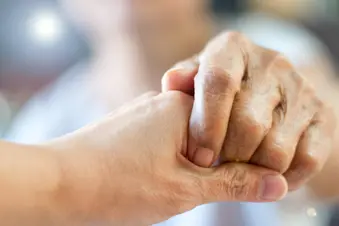
By Alison Massey, as told to Susan Bernstein
There is a perception that chemotherapy is like treatments from 20 or 30 years ago. They think it will have side effects that are not tolerable, but we have made significant advances in managing the toxicities that come with these cancer medications. People think chemo will make them sick, but that’s not the case. Each individual treatment regimen has its own side effect profile. If you look at the list of possible side effects, people can be overwhelmed. Most people will experience a side effect, but no one gets every possible side effect.
Generally, people will be a little tired or have a dip in energy level for a few days. But between your treatments, we hope that you’ll be able to live your normal life. We have many people who continue to work between their treatments.
Nausea is another common side effect, but we’ve made advances in how to manage nausea you may experience around your treatments as well. We can offer patients a range of anti-nausea medications. Some treatments do cause hair loss, and if that’s the case, we let you know that up front. It’s important to note that the vast majority do not cause hair loss, although some may cause hair thinning. We definitely have ways to help you manage these issues, including offering a prescription for wigs or other resources. With hair thinning, we can also check certain labs or get our dermatology colleagues involved to help you.
Fatigue is the main thing you may experience with radiation. Radiation can cause inflammation in your body as it kills the cancer. It’s the inflammation that causes the side effects. Depending on what is being radiated, you may have pain. For example, if you are receiving lung radiation, your esophagus can be involved because the radiation may be close to that area of your body. If so, you may have pain with swallowing or difficulty swallowing. You may even feel like food gets stuck after you swallow it. People who are having radiation may not realize that it could affect swallowing food.
Sometimes people will need radiation to a painful lesion. While receiving radiation at a particular spot for people with advanced lung cancer, you may have a flare-up of that pain. Ultimately, the hope is that pain will disappear. During this time, we can also treat you with pain medications or steroids like dexamethasone to minimize the inflammation that causes pain.
Checkpoint inhibitors [immunotherapy medications for lung cancer] can have side effects, but they are different than chemo because they act on your immune system. These medications can overactivate your immune system, which leads to the side effects. Sometimes, we see patients develop dermatitis, which appears as a rash, or experience colitis that causes diarrhea, or pneumonitis of your lungs, which may cause shortness of breath or a cough. Checkpoint inhibitors may also cause arthritis or myositis, which is inflammation of your muscles. Sometimes, we can even see swelling of your joints. It’s important that if patients notice any new symptoms while taking a checkpoint inhibitor, they let us know about it so we can initiate treatment. The quicker you tell us about these side effects, the sooner we can treat and reverse them.
Anxiety and depression are two things we deal with very often during cancer treatment. In my experience, people may feel lost when they are first diagnosed. But once you have found your oncologist and your whole cancer support team, and you know you have a plan of attack to treat your cancer, most people feel better. Many have a fear of cancer treatments and the potential impact of treatment on your quality of life. We let people know that they can still live their life and they should continue to do the things that they enjoy.
Your mood and outlook may depend on where you are in your cancer treatment course or disease progression. Early on, most people are more functional and have less fatigue. Some people may still be able to work. Others may need to hang out at home for a few days after each treatment. Our goal is that you don’t stay in bed the whole time you’re being treated for cancer. Keep an active schedule as much as you can. Realize that you will be tired after your treatment and plan for those days. And don’t forget to ask for help if you need it!
Sleeping well can also affect your mood and quality of life. A lot of our patients have insomnia. Often anxiety may be causing that insomnia. Your mind is racing, so you can’t sleep. Also, some of the meds you take for nausea or steroids for inflammation can rev you up and cause insomnia. And sometimes an annoying cough can disrupt your sleep.
Some people with lung cancer may need to use supplemental oxygen. In my experience, people struggle with the idea of wearing oxygen because, like the association with hair loss, now people on the outside are able to see that they are sick. But from a medical perspective, it’s important to wear it if you need it.
Loss of sexual function is something we can see in both men and women. In my experience, men are more vocal about this, so speak up, ladies, if you have any concerns! Erectile dysfunction can affect men during cancer treatment. Women may experience vaginal dryness or pain during intercourse. If that happens and you let us know, we can refer you to a sexual health doctor. Treatments can also affect women’s menstrual cycles. If you’re someone who could get pregnant, you should be careful to use contraception while you’re being treated for cancer.
Photo Credit: Pornpak Khunatorn / Getty Images
SOURCE:
Alison Massey, ANP-BC, Memorial Sloan Kettering Cancer Center, New York.
>>> Read full article>>>
Copyright for syndicated content belongs to the linked Source : WebMD – https://www.webmd.com/lung-cancer/features/nurse-treatment-unknowns?src=RSS_PUBLIC
